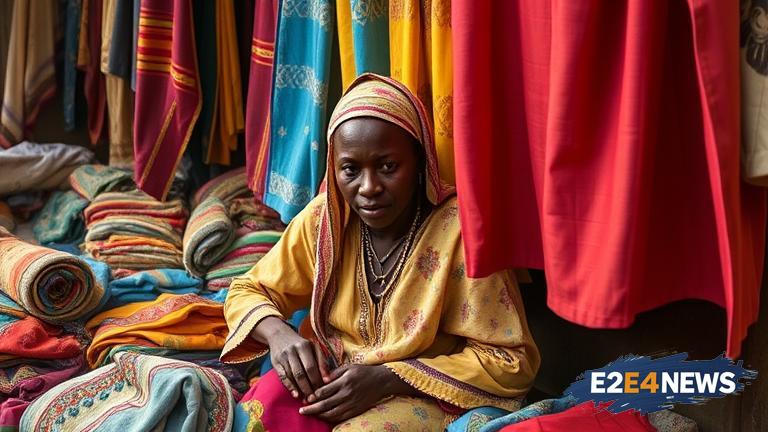The war in Tigray, Ethiopia, has had a profound impact on the region’s textile industry, with many factories forced to close and workers displaced. The conflict, which began in 2020, has resulted in significant damage to infrastructure, including roads, bridges, and buildings. The textile industry, which was once a thriving sector in Tigray, has been particularly hard hit, with many factories forced to shut down due to a lack of raw materials, electricity, and skilled labor. The war has also disrupted the supply chain, making it difficult for factories to access the materials they need to produce textiles. As a result, many textile workers have been forced to flee the region in search of work, leaving behind their homes and livelihoods. The situation has been exacerbated by the COVID-19 pandemic, which has further reduced demand for textiles and made it even more challenging for factories to operate. Despite efforts by the Ethiopian government to support the textile industry, the sector remains in crisis, with many factories struggling to recover from the devastating effects of the war. The textile industry is a significant contributor to Ethiopia’s economy, accounting for a substantial portion of the country’s exports. However, the war in Tigray has had a major impact on the industry, with exports declining significantly in recent years. The Ethiopian government has implemented various initiatives to support the textile industry, including providing financial assistance to factories and investing in infrastructure development. However, more needs to be done to address the root causes of the crisis and support the recovery of the textile industry in Tigray. The international community has also been called upon to provide support to the region, including humanitarian aid and economic assistance. The situation in Tigray is complex and multifaceted, with many different factors contributing to the crisis. However, with the right support and investment, it is possible for the textile industry to recover and thrive once again. The Ethiopian government has a critical role to play in supporting the industry, including providing financial assistance, investing in infrastructure development, and promoting the sector through marketing and trade initiatives. The international community can also play a key role in supporting the recovery of the textile industry in Tigray, including providing humanitarian aid, economic assistance, and technical support. The recovery of the textile industry in Tigray will require a sustained effort and commitment from all stakeholders, including the Ethiopian government, the international community, and the private sector. It will also require a comprehensive approach that addresses the root causes of the crisis and supports the development of the sector in a sustainable and equitable way. The textile industry is a vital part of Ethiopia’s economy, and its recovery is essential for the country’s economic growth and development. The industry provides employment opportunities for thousands of people, particularly women, and contributes to the country’s exports and foreign exchange earnings. However, the war in Tigray has had a devastating impact on the industry, and it will take time, effort, and investment to recover. The Ethiopian government and the international community must work together to support the recovery of the textile industry in Tigray, including providing financial assistance, investing in infrastructure development, and promoting the sector through marketing and trade initiatives. The private sector also has a critical role to play in supporting the recovery of the industry, including investing in new technologies and manufacturing processes, and providing training and employment opportunities for workers. The recovery of the textile industry in Tigray will require a long-term commitment and investment from all stakeholders, but it is essential for the country’s economic growth and development. The industry has the potential to be a major driver of economic growth and development in Ethiopia, but it requires the right support and investment to recover from the devastating effects of the war. The Ethiopian government and the international community must work together to provide the necessary support and investment to the industry, including financial assistance, infrastructure development, and technical support. The private sector must also play a key role in supporting the recovery of the industry, including investing in new technologies and manufacturing processes, and providing training and employment opportunities for workers. The recovery of the textile industry in Tigray is a complex and challenging task, but it is essential for the country’s economic growth and development. The industry has the potential to provide employment opportunities for thousands of people, particularly women, and contribute to the country’s exports and foreign exchange earnings. However, it requires the right support and investment to recover from the devastating effects of the war. The Ethiopian government, the international community, and the private sector must work together to provide the necessary support and investment to the industry, including financial assistance, infrastructure development, and technical support. The recovery of the textile industry in Tigray is a critical component of Ethiopia’s economic growth and development, and it requires a sustained effort and commitment from all stakeholders.
